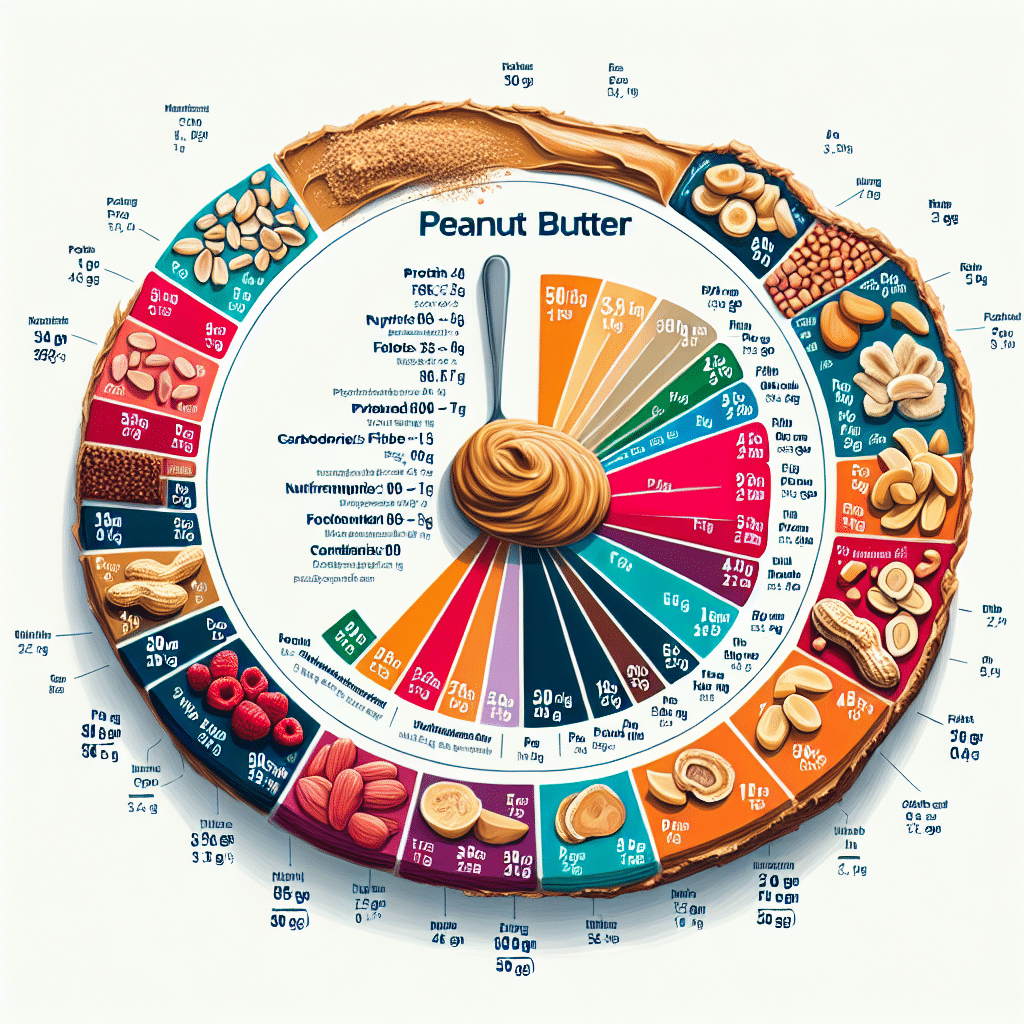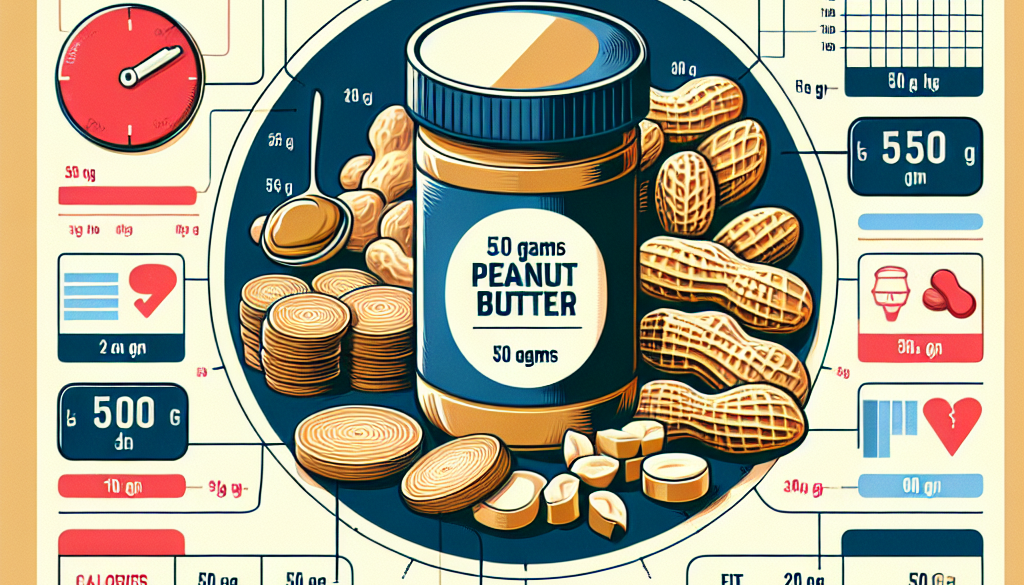50 Grams Peanut Butter: Nutrition Overview
-
Table of Contents
- 50 Grams Peanut Butter: Comprehensive Nutrition Overview
- Nutritional Breakdown of 50 Grams of Peanut Butter
- Caloric Content
- Macronutrients
- Micronutrients
- Dietary Fiber
- Sugar Content
- Health Benefits of Peanut Butter
- Potential Drawbacks
- Peanut Butter in Various Diets
- Case Studies and Statistics
- Conclusion: Key Takeaways
- Discover ETprotein’s High-Quality Protein Products
50 Grams Peanut Butter: Comprehensive Nutrition Overview

Peanut butter is a staple in many households, loved for its creamy texture and rich, nutty flavor. Beyond its taste, peanut butter is also recognized for its nutritional benefits. In this article, we will delve into the nutritional profile of 50 grams of peanut butter, exploring its macro- and micronutrient content, health benefits, and potential drawbacks. We will also look at how peanut butter fits into various diets and lifestyles, supported by relevant examples, case studies, and statistics.
Nutritional Breakdown of 50 Grams of Peanut Butter
Understanding the nutritional value of peanut butter begins with a detailed look at what 50 grams, approximately equivalent to two tablespoons, contains:
- Calories
- Macronutrients (Proteins, Carbohydrates, Fats)
- Micronutrients (Vitamins and Minerals)
- Dietary Fiber
- Sugar Content
Let’s break down each of these components to understand their impact on health.
Caloric Content
50 grams of peanut butter typically contains around 300 calories. This energy comes primarily from fats, with a significant contribution from proteins and carbohydrates.
Macronutrients
The macronutrient distribution in 50 grams of peanut butter is as follows:
- Proteins: Approximately 12-15 grams, making it a good source of plant-based protein.
- Carbohydrates: Roughly 8-10 grams, with a low glycemic index.
- Fats: About 24-26 grams, predominantly monounsaturated and polyunsaturated fats, which are beneficial for heart health.
Micronutrients
Peanut butter is also rich in various vitamins and minerals:
- Vitamin E
- Magnesium
- Phosphorus
- Zinc
- Niacin
- Vitamin B6
These nutrients play crucial roles in maintaining bodily functions and overall health.
Dietary Fiber
With about 2-3 grams of fiber per 50 grams, peanut butter can contribute to daily fiber intake, aiding digestion and promoting satiety.
Sugar Content
While natural peanut butter contains minimal sugar, some commercial brands add sugar for flavor. It’s essential to check the label for added sugars when considering peanut butter’s nutritional profile.
Health Benefits of Peanut Butter
Peanut butter isn’t just delicious; it offers several health benefits:
- Heart Health: The unsaturated fats in peanut butter can help lower bad cholesterol levels and reduce the risk of heart disease.
- Weight Management: The protein and fiber content can promote satiety, helping to control appetite and support weight management.
- Muscle Building: As a protein-rich food, peanut butter supports muscle repair and growth, making it popular among athletes and bodybuilders.
- Blood Sugar Control: Its low glycemic index makes it a suitable option for people with diabetes, as it doesn’t cause significant blood sugar spikes.
Potential Drawbacks
Despite its benefits, there are some considerations to keep in mind:
- Calorie Density: Due to its high fat content, peanut butter is calorie-dense, which could contribute to weight gain if consumed in excess.
- Allergies: Peanut allergies are common and can be severe. Those with allergies should avoid peanut butter.
- Added Ingredients: Some brands add unhealthy ingredients like trans fats and excessive sugars, which can negate the health benefits.
Peanut Butter in Various Diets
Peanut butter can fit into many dietary patterns, including:
- Vegetarian and Vegan Diets: As a plant-based protein source, it’s an excellent option for those avoiding animal products.
- Keto Diet: While it’s higher in carbs than other nuts, it can still be included in a ketogenic diet in moderation.
- Gluten-Free Diet: Naturally gluten-free, peanut butter is safe for those with celiac disease or gluten sensitivity.
Case Studies and Statistics
Several studies have highlighted the benefits of including peanut butter in the diet:
- A study published in the Journal of the American Medical Association found that consuming peanut butter could reduce the risk of type 2 diabetes in women.
- Research in the British Journal of Nutrition suggested that peanut butter consumption is associated with a reduced risk of cardiovascular disease.
Statistics show that peanut butter is a popular choice for health-conscious consumers, with the global peanut butter market expected to grow significantly in the coming years.
Conclusion: Key Takeaways
In conclusion, 50 grams of peanut butter offers a rich source of nutrients, including healthy fats, proteins, and essential vitamins and minerals. It can support heart health, aid in weight management, and contribute to muscle building and blood sugar control. However, it’s important to consume it in moderation and be mindful of added ingredients in certain brands. By choosing natural, unsweetened peanut butter, individuals can enjoy its health benefits as part of a balanced diet.
Discover ETprotein’s High-Quality Protein Products
If you’re looking to incorporate more plant-based proteins into your diet, consider exploring ETprotein’s range of products. Their organic, non-GMO, allergen-free peanut protein and other plant proteins are perfect for enhancing your nutritional intake. Whether you’re involved in sports nutrition, weight management, or general health and wellness, ETprotein has a solution for you.
About ETprotein:
ETprotein, a reputable peanut protein Chinese factory manufacturer and supplier, is renowned for producing, stocking, exporting, and delivering the highest quality organic bulk vegan protein and plant proteins. They include Organic rice protein, clear rice protein, pea protein, clear pea protein, pumpkin seed protein, sunflower seed protein, mung bean protein, peanut protein etc. Their offerings, characterized by a neutral taste, non-GMO, allergen-free attributes, cater to a diverse range of industries. They serve nutraceutical, pharmaceutical, cosmeceutical, veterinary, as well as food and beverage finished product distributors, traders, and manufacturers across Europe, USA, Canada, Australia, Thailand, Japan, Korea, Brazil, and Chile, among others.
ETprotein specialization includes exporting and delivering tailor-made protein powder and finished nutritional supplements. Their extensive product range covers sectors like Food and Beverage, Sports Nutrition, Weight Management, Dietary Supplements, Health and Wellness Products, and Infant Formula, ensuring comprehensive solutions to meet all your protein needs.
As a trusted company by leading global food and beverage brands and Fortune 500 companies, ETprotein reinforces China’s reputation in the global arena. For more information or to sample their products, please contact them and email sales(at)ETprotein.com today.














